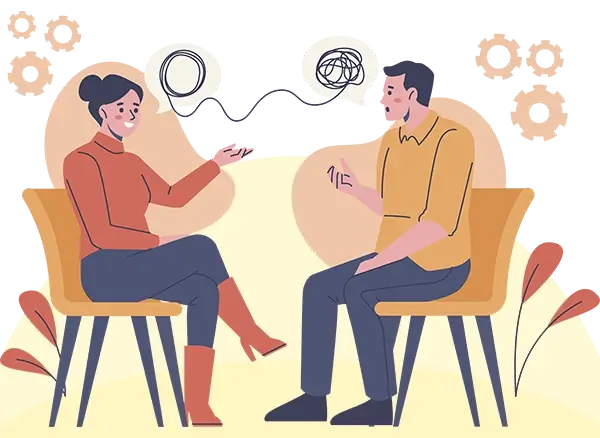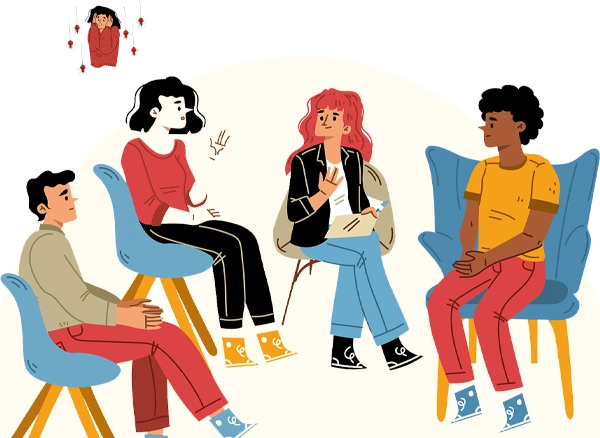Learn whether you may be living with Adjustment Disorder with this expert-reviewed test. After receiving your results, you’ll have the opportunity to learn more about your symptoms and talk to a licensed therapist.
Begin TestThis mental health assessment is not a diagnosis or a substitute for licensed therapy. For more information on how to get scheduled with a qualified mental health professional, read our guide here.
Have you ever felt as though you have difficulty controlling your emotions and behaviors when confronted with stressful situations? If so, this test may be for you. This free online assessment is meant to provide insight into if there is a possibility you may have an adjustment disorder. There are six major types of adjustment disorders. This online test is not meant to act as a formal diagnosis or to replace a mental health professional. The test is meant to be an informative tool.
Begin Test
The symptoms of an adjustment disorder differ based on the specific types of disorders. Some of the various symptoms of adjustment disorders include feeling sad or hopeless, having trouble sleeping, not eating enough, feeling high levels of stress and anxiety, and having mood swings. You may also experience other symptoms not listed above.
Adjustment disorders are typically caused by experiencing stressors in life. The mental health condition can be caused by experiencing previous trauma, dealing with chronic stress, and experiencing a major life change. The cause of the adjustment disorder can differ based on the unique individual and what causes them stress.
Therapists often use psychotherapy, also known as talk therapy, to treat adjustment disorders. In psychotherapy, therapists can help individuals with identifying their stressors and developing coping mechanisms. The therapist can also help you address why certain situations may be so stressful and cause such a strong reaction. This can help you with understanding any other possible triggers which may present themselves in the future. In some cases, medications such as anti-anxiety pills and antidepressants may be prescribed along with the therapy sessions.
If you think you may have an adjustment disorder but don’t score highly on this test, it’s worth it to talk to a mental health professional. With the six types of adjustment disorders, there are a variety of ways the mental disorder may present itself. One ten question quiz can not fully capture all the possible symptoms associated with the types of adjustment disorders. It is always best to reach out to a mental health professional for more support and information.
Adjustment disorders affect a variety of people. You are not alone. Talk therapy is a proven way to treat adjustment disorders. The first step is to find a therapist who fits your needs. They will provide a customized treatment plan that suits your unique needs. Then you can choose between in-person or online therapy. With virtual therapy, you can receive mental health treatment for adjustment disorder from the comfort of your home. Our online therapists provide coping methods for the triggers and stressors associated with your adjustment disorder. Reach out to Lifebulb today for more information.
Find a Therapist

An example of an adjustment disorder is a teenager who has to move states and start over at a new High School because their parents got a new job. The transition triggered anxiety, self-isolation, and feelings of overwhelm. They used to be very social, but now rarely leave their room. Their grades are slipping, and they have panic attacks often.
An adjustment disorder can involve feeling very anxious, sad, or overwhelmed after a major life change, like losing a job, going through a divorce, or moving to a new city. These emotional or behavioral reactions are stronger than expected and can disrupt daily life.
Treatment for adjustment disorder often includes psychotherapy, especially Cognitive Behavioral Therapy (CBT). This approach helps people manage stress and develop healthy coping skills. Supportive counseling, stress management techniques, and sometimes short-term medication for anxiety or depression may also be recommended.
The presence of a traumatic event is the distinguishing factor between PTSD and adjustment disorder. PTSD occurs after experiencing or witnessing a life-threatening or traumatic event. It often involves flashbacks, nightmares, and increased arousal. In contrast, adjustment disorder happens in response to a stressful but not necessarily life-threatening event. Its symptoms tend to be less severe and short-term, usually resolving within six months after addressing the stressor.
According to the DSM-5, an adjustment disorder is diagnosed when:
Emotional or behavioral symptoms arise within three months of a stressor.
Symptoms are clinically significant, causing noticeable distress or problems in social, work, or other important areas.
The reaction is inappropriate to the severity of the stressor.
Symptoms do not indicate another mental disorder and are not a worsening of a preexisting condition.
Symptoms do not last more than six months after the stressor or its effects have ended (except in chronic cases).
If you meet this criterion, talk to a therapist about treatment options.
Adjustment behavior is caused by any stressful trigger that requires an adjustment to be made. For example, common triggers of adjustment disorder include:
Moving
Major changes to a family (like a death or a new birth)
Losing your job
A divorce
These are just some causes of adjustment disorder. Any major change could cause adjustment disorder. Talk to a therapist if you think you might be struggling with it.